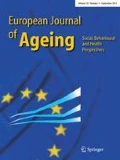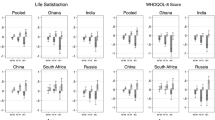Abstract
We use questionnaire data from the MIDUS study (N = 6325 and a subsample n = 2120) to examine the extent to which people in their late 20s, late 40s and late 60s think that positive characteristics apply to themselves, their age peers and other age groups. Results based on factor analysis confirmed the existence of age stereotypes, such that one constellation of characteristics (wise, caring, calm, knowledgeable, generative; “wise”) was seen as more descriptive of older adults, while another constellation of characteristics (energetic, healthy, willing to learn; “energetic”) was seen as more descriptive of younger adults. Self-evaluations were, however, highly positive and largely independent of age. As a group, younger adults saw themselves as being as “energetic” but “wiser” than their age peers, while older adults saw themselves as being more “energetic” but less “wise” than their age peers. In sum, the results suggest that self-views are relatively independent of existing age stereotypes but also indicate that the “better-than-average effect” depends on age and whether the considered characteristics represent a relative strength or weakness of one’s own age group. The results also indicate that, at the aggregate level, older adults’ tendency to use stereotypes about their age group’s weaknesses as a frame of reference for making flattering self-evaluations seems to outweigh the effects of stereotype internalization.



Similar content being viewed by others
References
Alicke MD, Govorun O (2005) The Better-Than-Average Effect. In: Alicke MD, Dunning A, Krueger JI (eds) Studies in self and identity: the self in social judgment. Psychology Press, New York, pp 85–106
Bowen CE, Skirbekk V (2013) National stereotypes of older people’s competence are related to older adults’ participation in paid and volunteer work. J Gerontol B Psychol Sci Soc Sci 68:974–983. https://doi.org/10.1093/geronb/gbt101
Bowen CE, Kornadt A, Kessler E-M (2014) Die Rolle von Altersbildern im Lebenslauf [The role of images of aging in the life course]. In: Wahl H-W, Kruse A (eds) Lebensläufe im Wandel–Sichtweisen verschiedener Disziplinen. Kohlhammer, Stuttgart, pp 287–298
Brandtstädter J, Greve W (1994) The aging self: stabilizing and protective processes. Dev Rev 14:52–80. https://doi.org/10.1006/drev.1994.1003
Brim OG, Ryff CD, Kessler RC (2004) MIDUS national survey: an overview. In: Brim OG, Ryff CD, Kessler RC (eds) How healthy are we? A national study of well-being at midlife. University of Chicago Press, Chicago, pp 1–34
Cohen J (1992) A power primer. Psychol Bull 112:155–159. https://doi.org/10.1037/0033-2909.112.1.155
Cuddy AJC, Norton MI, Fiske ST (2005) This old stereotype: the pervasiveness and persistence of the elderly stereotype. J Soc Issues 61:267–285. https://doi.org/10.1111/j.1540-4560.2005.00405.x
Diehl M, Wahl H-W, Barrett AE et al (2014) Awareness of aging: theoretical considerations on an emerging concept. Dev Rev 34:93–113. https://doi.org/10.1016/j.dr.2014.01.001
Freund AM, Ritter JO (2009) Midlife crisis: a debate. Gerontology 55:582–591. https://doi.org/10.1159/000227322
Greve W, Wentura D (2010) True lies: self-stabilization without self-deception. Conscious Cogn 19:721–730. https://doi.org/10.1016/j.concog.2010.05.016
Grühn D, Gilet A-L, Studer J, Labouvie-Vief G (2011) Age-relevance of person characteristics: persons’ beliefs about developmental change across the lifespan. Dev Psychol 47:376–387. https://doi.org/10.1037/a0021315
Heckhausen J, Brim OG (1997) Perceived problems for self and others: self-protection by social downgrading throughout adulthood. Psychol Aging 12:610–619
Heckhausen J, Krueger J (1993) Developmental expectations for the self and most other people: age grading in three functions of social comparison. Dev Psychol 29:539–548
Hess TM (2006) Attitudes toward aging and their effects on behaviour. In: Birren JE, Schaie KW, Abeles RP, Gatz M, Salthouse T (eds) Handbook of the psychology of aging, 6th edn. Elsevier, Amsterdam, pp 379–406. https://doi.org/10.1016/B978-012101264-9/50020-3
Hummert ML (2015) Experimental research on age stereotypes: insights for subjective aging. Ann Rev Gerontol Geriatr 35:79–97. https://doi.org/10.1891/0198-8794.35.79
Hummert ML, Garstka TA, Shaner JL, Strahm S (1994) Stereotypes of the elderly held by young, middle-aged, and elderly adults. J Gerontol 49:240–249
Hummert ML, Shaner JL, Garstka TA, Henry C (1998) Communication with older adults: the influence of age stereotypes, context, and communicator age. Hum Commun Res 25:124–151. https://doi.org/10.1111/j.1468-2958.1998.tb00439.x
Kornadt AE (2016) Do age stereotypes as social role expectations for older adults influence personality development? J Res Pers 60:51–55. https://doi.org/10.1016/j.jrp.2015.11.005
Kornadt AE, Rothermund K (2015) Views on aging: domain-specific approaches and implications for developmental regulation. Ann Rev Gerontol Geriatr 35:121–144. https://doi.org/10.1891/0198-8794.35.121
Kornadt AE, Voss P, Rothermund K (2015) Age stereotypes and self-views revisited: patterns of internalization and projection processes across the life span. J Gerontol B Psychol Sci Soc Sci. https://doi.org/10.1093/geronb/gbv099
Kuypers JA, Bengtson VL (1973) Social breakdown and competence. Hum Dev 16:181–201. https://doi.org/10.1159/000271275
Lamont RA, Swift HJ, Abrams D (2015) A review and meta-analysis of age-based stereotype threat: negative stereotypes, not facts, do the damage. Psychol Aging 30:180–193. https://doi.org/10.1037/a0038586
Levy B (2009) Stereotype embodiment: a psychosocial approach to aging. Curr Dir Psychol Sci 18:332–336. https://doi.org/10.1111/j.1467-8721.2009.01662.x
Levy BR, Slade MD, Kunkel SR, Kasl SV (2002) Longevity increased by positive self-perceptions of aging. J Pers Soc Psychol 83:261–270. https://doi.org/10.1037/0022-3514.83.2.261
Levy BR, Zonderman AB, Slade MD, Ferrucci L (2009) Age stereotypes held earlier in life predict cardiovascular events in later life. Psychol Sci 20:296–298. https://doi.org/10.1111/j.1467-9280.2009.02298.x
Levy BR, Slade MD, Murphy TE, Gill TM (2012) Association between positive age stereotypes and recovery from disability in older persons. JAMA 308:1972–1973. https://doi.org/10.1001/jama.2012.14541
Lin T, Ankudowich E, Ebner NC (2017) Greater perceived similarity between self and own-age others in older than young adults. Psychol Aging 32:377–387. https://doi.org/10.1037/pag0000173
Löckenhoff CE, De Fruyt F, Terracciano A et al (2009) Perceptions of aging across 26 cultures and their culture-level associates. Psychol Aging 24:941–954. https://doi.org/10.1037/a0016901
Luszcz MA, Fitzgerald KM (1986) Understanding cohort differences in cross-generational, self, and peer perceptions. J Gerontol 41:234–240. https://doi.org/10.1093/geronj/41.2.234
Meisner BA (2012) A meta-analysis of positive and negative age stereotype priming effects on behaviour among older adults. J Gerontol B Psychol Sci Soc Sci 67B:13–17. https://doi.org/10.1093/geronb/gbr062
Menkin JA, Robles TF, Gruenewald TL et al (2016) Positive expectations regarding aging linked to more new friends in later life. J Gerontol B Psychol Sci Soc Sci. https://doi.org/10.1093/geronb/gbv118
Mickler C, Staudinger UM (2008) Personal wisdom: validation and age-related differences of a performance measure. Psychol Aging 23:787–799. https://doi.org/10.1037/a0013928
North MS, Fiske ST (2015) Modern attitudes toward older adults in the aging world: a cross-cultural meta-analysis. Psychol Bull 141:993–1021. https://doi.org/10.1037/a0039469
Peterson L, Ralston M (2017) Valued elders or societal burden: cross-national attitudes toward older adults. Int Sociol 32:731–754. https://doi.org/10.1177/0268580917726943
Pinquart M (2002) Good news about the effects of bad old-age stereotypes. Exp Aging Res 28:317–336. https://doi.org/10.1080/03610730290080353
Popham LE, Hess TM (2015) Theories of age stereotyping and views of aging. In: Pachana NA (ed) Encyclopedia of geropsychology. Springer, Singapore, pp 1–10
Rodin J, Langer E (1980) Aging labels: the decline of control and the fall of self-esteem. J Soc Issues 36:12–29. https://doi.org/10.1111/j.1540-4560.1980.tb02019.x
Rothermund K (2005) Effects of age stereotypes on self-views and adaptation. In: Greve W, Rothermund K, Wentura D (eds) The adaptive self: personal continuity and intentional self-development. Hogrefe and Huber, Ashland, pp 223–242
Rothermund K, Brandtstädter J (2003) Age stereotypes and self-views in later life: evaluating rival assumptions. Int J Behav Dev 27:549–554. https://doi.org/10.1080/01650250344000208
Rudman LA, Phelan JE, Heppen JB (2007) Developmental sources of implicit attitudes. Pers Soc Psychol Bull 33:1700–1713. https://doi.org/10.1177/0146167207307487
Ryan EB, Hummert ML, Boich LH (1995) Communication predicaments of aging: patronizing behaviour toward older adults. J Lang Soc Psychol 14:144–166. https://doi.org/10.1177/0261927X95141008
Sedikides C, Alicke MD (2012) Self-enhancement and self-protection motives. Oxford University Press, Oxford. https://doi.org/10.1093/oxfordhb/9780195399820.013.0017
Staudinger UM (1999) Older and wiser? Integrating results on the relationship between age and wisdom-related performance. Int J Behav Dev 23:641–664. https://doi.org/10.1080/016502599383739
Staudinger UM (2015) Images of aging: outside and inside perspectives. Ann Rev Gerontol Geriatr 35:187–209. https://doi.org/10.1891/0198-8794.35.187
Staudinger UM, Glück J (2011) Psychological wisdom research: commonalities and differences in a growing field. Annu Rev Psychol 62:215–241. https://doi.org/10.1146/annurev.psych.121208.131659
Staudinger UM, Kessler E-M (2009) Adjustment and growth: two trajectories of positive personality development across adulthood. In: Smith MC, DeFrates-Densch N (eds) Handbook of research on adult learning and development. Routledge, New York, pp 241–268
Taylor SE, Brown JD (1988) Illusion and well-being: a social psychological perspective on mental health. Psychol Bull 103:193–210. https://doi.org/10.1037/0033-2909.103.2.193
Voss P, Kornadt AE, Hess TM et al (2018) A world of difference? Domain-specific views on aging in China, the US, and Germany. Psychol Aging 33:595–606. https://doi.org/10.1037/pag0000237
Weiss D, Freund AM (2012) Still young at heart: negative age-related information motivates distancing from same-aged people. Psychol Aging 27:173–180. https://doi.org/10.1037/a0024819
Weiss D, Kornadt AE (2018) Age-stereotype internalization and dissociation: contradictory processes or two sides of the same coin? Curr Dir Psychol Sci 27:477–483. https://doi.org/10.1177/0963721418777743
Weiss D, Lang FR (2012) “They” are old but “I” feel younger: age-group dissociation as a self-protective strategy in old age. Psychol Aging 27:153–163. https://doi.org/10.1037/a0024887
Wurm S, Diehl M, Kornadt AE et al (2017) How do views on aging affect health outcomes in adulthood and late life? Explanations for an established connection. Dev Rev 46:27–43. https://doi.org/10.1016/j.dr.2017.08.002
Zell E, Alicke MD (2011) Age and the better-than-average effect. J Appl Soc Psychol 41:1175–1188. https://doi.org/10.1111/j.1559-1816.2011.00752.x
Acknowledgements
This work is a result of the research network “Images of Aging: Via a dynamic life span model to new perspectives for research and practice”, funded by a grant of the German Research Foundation (KL 3072/1-1) awarded to Verena Klusmann.
Funding
Since 1995 the MIDUS study has been funded by the following: John D. and Catherine T. MacArthur Foundation Research Network, National Institute on Aging (P01-AG020166), and the National Institute on Aging (U19-AG051426).
Author information
Authors and Affiliations
Corresponding author
Additional information
Publisher's Note
Springer Nature remains neutral with regard to jurisdictional claims in published maps and institutional affiliations.
Responsible Editor: Matthias Kliegel.
Guest editors: Anna Kornadt and Verena Klusmann.
Rights and permissions
About this article
Cite this article
Bowen, C.E., Spuling, S.M., Kornadt, A.E. et al. Young people feel wise and older people feel energetic: comparing age stereotypes and self-evaluations across adulthood. Eur J Ageing 17, 435–444 (2020). https://doi.org/10.1007/s10433-019-00548-4
Published:
Issue Date:
DOI: https://doi.org/10.1007/s10433-019-00548-4




